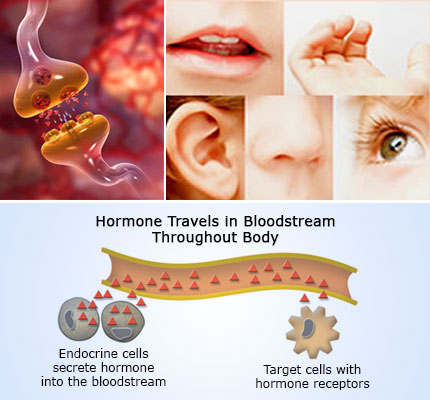 Neurons, hormones and five senses play an important role in communication in the body
Neurons, hormones and five senses play an important role in communication in the body
This particular phenomenon is carried out through the activities of the nervous and endocrine systems.
The nervous system is a rapid communication system. The central nervous system consists of
- The brain, situated inside the skull.
- The spinal cord, which extends from the base of the skull to the lumbar region and is protected from injury by the bones of the spinal column.
The peripheral nervous system is a network of nerve fibers, which are:
- Sensory or afferent nerves that transmit signals from the body to the brain, or
- Motor or efferent nerves, which transmit signals from the brain to the effector organs, such as muscles and glands.
The somatic (common) senses are touch, pain, heat and cold, and they arise following stimulation of specialized sensory receptors at nerve endings found throughout the skin.
There are different receptors in muscles and joints that respond to changes in the position and orientation of the body, maintaining posture and balance. Yet other receptors are activated by stimuli in internal organs and control vital body functions, e.g; heart rate, respiratory rate and blood pressure. Stimulation of any of these receptors sets up impulses that are conducted to the brain in sensory (afferent) nerves.
Communication along nerve fibers (cells) is by electrical impulses that are generated when nerve endings are stimulated. Nerve signals travel at great speed, so response to a nerve signal is almost immediate, making rapid and fine adjustments to body functions possible.
Communication between nerve cells is also required, since more than one nerve is involved in the chain of events occurring between the initial stimulus and the reaction to it. Nerves communicate with each other by releasing a chemical (the neurotransmitter) into tiny gaps between them. The neurotransmitter quickly travels across the gap and either stimulates or inhibits the next nerve cell, thus ensuring the message is transmitted.
Sensory nerves send signals from the body to the appropriate parts of the brain, where the incoming information is analyzed and collated. The brain responds by sending signals along motor (efferent) nerves to be appropriate effector organ(s). In this way, many aspects of body function are continuously monitored and adjusted, usually by negative feedback control, and usually without conscious awareness, e.g. regulation of blood pressure.
Communication through endocrine system and sensory system : From the blood stream, the hormones communicate with the body by heading towards their target cell to bring about a particular change or effect to that cell. Humans use the five senses of sight, hearing, taste, touch, and smell to communicate.It may seem like a simple process to see your friend or listen to someone talking, but there are many processes taking place inside the body to receive messages through the senses.